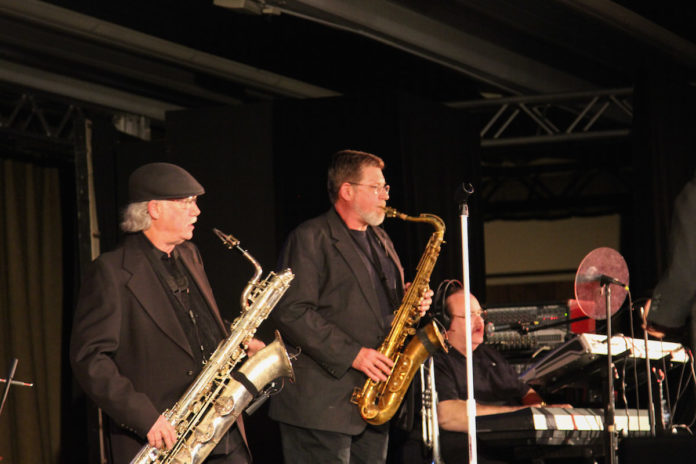It was cold outside, but SRU had the month of May on Friday night when the Legacy of Motown Revue—backed by Sound Express—filled the University Union with classic tunes from the Temptations, the Drifters, and more Motown favorites. The Legacy is composed of four talented singers and dancers trained in the art of transporting their audiences back to the times of crooners and big band music, and Sound Express is led by Stanley Stigall, who worked with the original Drifters and the Temptations.
Stigall said he began his career in music back when the Monkees and the Beatles were making it big on the music scene. He was taking piano lessons, mostly so he could play in church, and he started watching different musical groups at his local skating rink.
“I was like, ‘man, I gotta do that, that’s cool,” Stigall said. “So I started playing with my buddies in garage bands.”
Stigall attended Elon College, now Elon University, where he played in the jazz band with tenor saxophone player Mark Payne for a year; Stigall was a senior, Payne was a sophomore. Stigall said, after he graduated, he didn’t see Payne again for 37 years when he called up a local talent agency looking for a saxophonist and was directed back to Payne, who was teaching band and dreaming of getting out there and playing again.
“We don’t play as much as we used to,” Stigall said. “We still play 75 dates a year all over the eastern seaboard.”
At those 75 shows-a-year, Stigall, as well as The Legacy vocalist LeDerris Smith, hope to inspire happiness in the audience with what they do, because everyone has something going on that they don’t want to talk about, but the music helps them ignore those pains for a while.
“Everybody has some pain in their life,” Stigall said. “From the time we start, for that two hours or so that you’re here, you’re not thinking about that. You’re thinking about having a good time.”
Smith owes his involvement in performance to his grandmother who, in 1990, made him sweep her floors with the music of the Temptations in the background. He gained an appreciation for the ‘golden oldies,’ and now he enjoys being a young ambassador for the genre.
“This music transcends time,” Smith said. “It needs to be pushed and, being a young ambassador for this genre of music, I love being able to listen to it as well as perform it.”
Smith himself said he’s had the pleasure of performing at big-name corporations, homeless shelters and colleges, and everywhere he’s been, he’s loved the audiences because when people come to these concerts, they come to let go of anything bringing them down and instead, be lifted up by the music.
“For that moment of time that we get to perform, they’re free,” Smith agreed. “They’re going through aches and pains, but when they’re dancing, there’s a special type of adrenaline. They’re not picking up cars but they’re out of their wheelchairs and off their crutches, and they’re boogie-ing.”
Motown-era music touches lives, especially according to Smith and Stigall, because a lot of the music from the time that’s remembered is lasting so long for a reason.
“5,000 songs a week are written all over the country, but the ones like ‘When a Man Loves a Woman’ and ‘Unchained Melody,’ some of these songs that stay around, it’s because they’re that good,” Stigall said. “They hit a nerve.”








